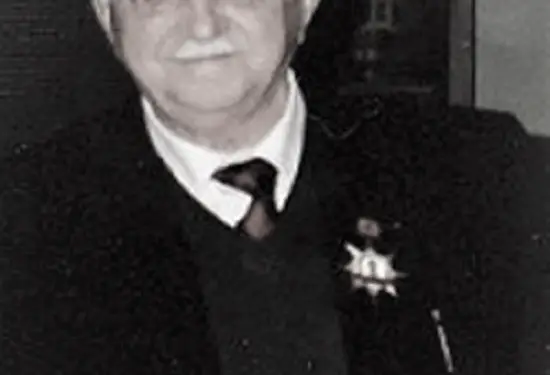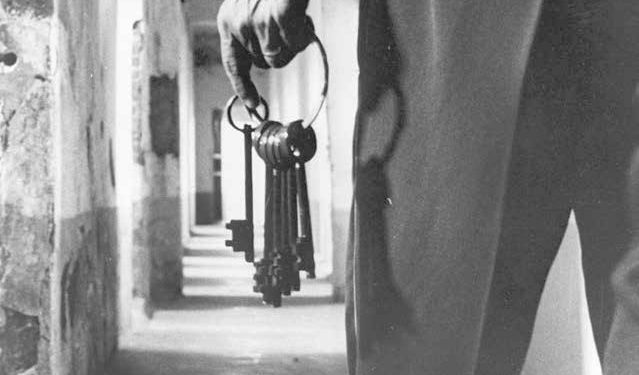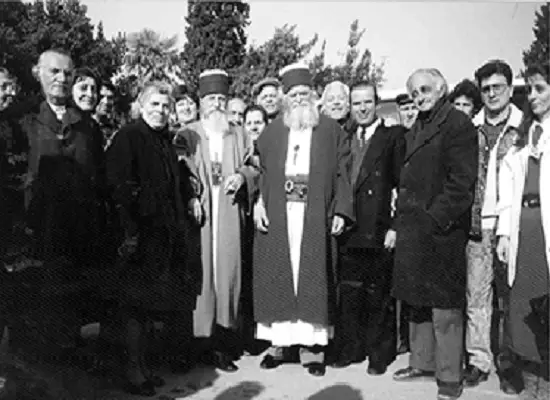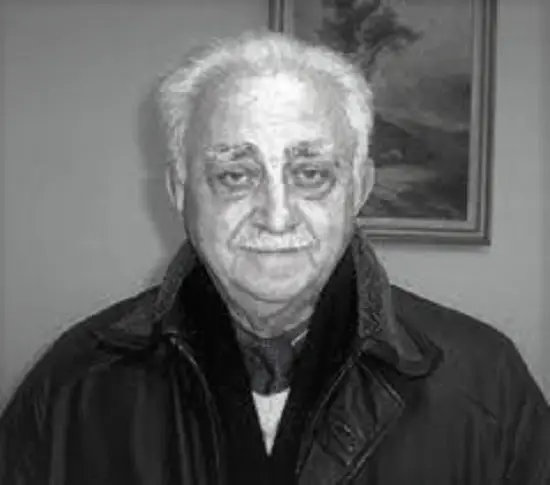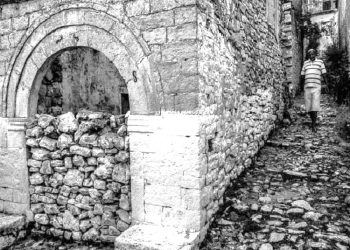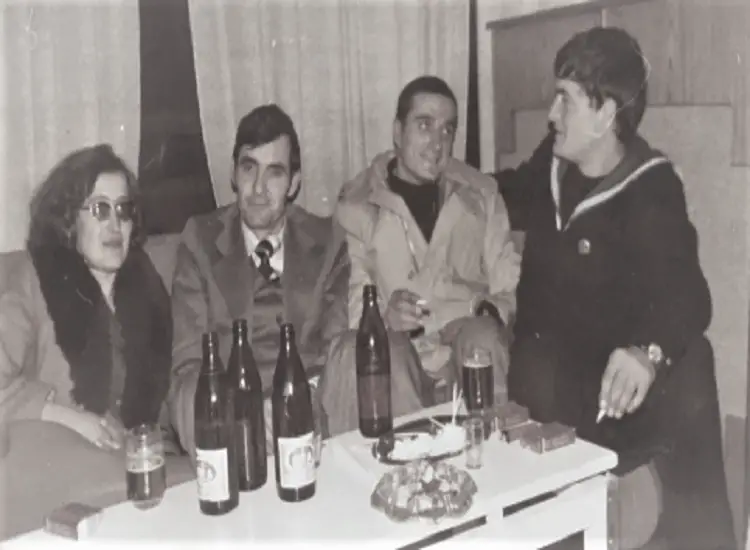From Tomorr Aliko
Memorie.al / The very appearance of the Gjirokastra Castle were terrifying. The main tunnel led to the darkness of the cellars, to the great hall of the prison, where hundreds of people were sent, on whom the dictatorship acted mercilessly. The ones who decided the fate of the victims were the investigating officers, who came out of the partisan war, with primary and some secondary education. I also had such an investigator. For thirty months I was at their mercy. They didn’t use anything on my body: the electric current, the frying iron, the vest, the dehydration, standing on one leg until I passed out, not to mention the sticks, kicks and punches. All this was done to admit that I was an agent of the Greek Asfalia, even though they knew that Asfalia imprisoned me in Ioannina.
In the terrible prison of Gjirokastra Castle…!
There was Dante’s hell, it was horror, hell. Anyone who has tried it and survived can tell. Chambers or dungeons, 2 m. by 3 m., a small hole in the ceiling through which a dim light penetrated, the cement floor, which was always damp. The bed was a straw mattress and a rotten mat. They gave us 600 gr. bread and nothing else. Every 15 days, with the permission of the investigator, some food was allowed from the family.
I will never forget the night of August 22, 1946. It was the middle of the night. The door opens and the investigator and two policemen enter. They put the irons on my hands, the main doors were opened, they put me in a “Jeep” and we left. I didn’t know where they were taking me, but I had heard that they shoot even without court orders. We stopped by the river, near the city cemetery, a favorite spot for shooting.
– “The end has come,” the investigator told me. Just one word saves your life. Admit that you are an agent of the Greeks”.
The investigator reeked of brandy. Everything is expected of a drunkard, I thought. I told the executioner that I have not been and will not become an agent of any state.
– Don’t get tired, follow the plan you got, – I told him.
Although life is painful, when a person is near death he becomes stronger. I remember shouting: Down with communism! Long live Albania! In those moments I thought that the whole world heard these words. One of the policemen was getting the machine gun ready. The investigator kicked me in the gut and I was knocked unconscious.
I don’t know how long this situation lasted, only when I opened my eyes did I see the director of the prison, who put me in his car and took me to where they had taken me. No one said a word to me about it. Now I seemed to be a different person, braver, prouder. I lived with death and I expected it from moment to moment. After this incident, I never saw the ignorant investigator again.
Days and months passed. Minutes were repeated several times, but my attitude was the same. They provoked me with a spy, an old man, sentenced to life imprisonment. I had heard his name as a fighter in 1920 in Vlora with Selam Musana. I told him what I had not said on the record. I also opened my heart to the old dotard about the fact that a person needs to confess before he dies. This added more to my suffering. I don’t want to say his name because I don’t want his children to bear the shame of their father.
In the prison hospital of Tirana
After 5 years, they brought him to the Tirana prison hospital where I was also. I shuddered all over when I saw it. For a moment I covered my head with a blanket, I was ashamed to look at him. The impudent one came to my bedside, knelt down and begged for forgiveness. I sent him away saying: you are a corpse to me and I am ashamed to deal with you. I got sicker, I didn’t want to see him with my eyes, but, thankfully, after a week he was operated on and he was no longer allowed in my room.
The last one who interrogated me was an investigator, a major officer of the Ministry of Internal Affairs, Thoma Karamelo, a loyalist of Minister Koçi Xoxe, who stood out from the other investigators for his culture. Finally, the record was closed and after a few days I was taken to the dungeons of the ‘New Prison’ of Tirana, the same dungeons, only they had windows and the room was bigger. I spent another four months here, until I was court-martialed.
I knew that the decision of my punishment had been made by the State Security and the trial was quite formal. On September 30, 1947, two policemen put me in handcuffs and put me in a jeep. One of them, showing me the automatic, says: “This one will sing tomorrow night”. I thought everyone wanted blood. I looked at him with contempt.
I found myself in a courtroom. The prosecutor and three judges were waiting for their prey. There were some papers on the table. As they asked me about my identity, they read the minutes. The prosecutor pointed out the danger I presented, treason against the motherland, thus asking the jury for my capital punishment. The chairman asked me for the last word, which was of no value, since everything was decided.
I told them that I have not committed any crime and I have never betrayed my country. The jury and the prosecutor retired for 5 minutes. The verdict was: life imprisonment. It seemed to me that I was freed. They took me out and escorted me to the “Old Prison” in Tirana, where after 17 months I am among friends of the ideal and of suffering. I had become so weak that I could barely stand.
In the so-called: “Prison Nurse”
During the entire time of serving the sentence in the prisons of the dictatorship (17 years), I was constantly isolated in the so-called “Prison Infirmary”. The closure there was a preventive measure to prevent the spread of infectious diseases. Also, the “death room” was reserved for us there, in the building in front of the Civil Hospital and under the vigilant supervision of the police and State Security operatives. This old building with two floors was named “Burg Hospital”.
In one of the upstairs rooms, there were the policemen, the nurse and the cleaner. The other room, which had five iron beds, was reserved for some privileged with pathological diseases, while those with T.B.C. were sent to the basement of the lower floor, which was named the “Death Room”, equipped with four beds. The walls of that room drained water from the humidity, because it was half a meter underground.
I was hospitalized three times in this “Hospital”, not to cure me, but to shorten my life and take me to the next world. I have tied the lips of some fellow sufferers, and still ring in my ears the benedictions, groans, sighs and curses against the barbaric regime that took their lives. Law-abiding police officers were not at all impressed by mandates given to the families of the dead. “Go look for him in the cemetery” – they told them.
…During the entire dungeon-prison period, I had the “Hand of God” by my side, which protected me, gave me strength, courage and hope to face difficulties. Someone has faith in God by hearing, while I have tried his hand.
The prophetic words of the former Bektashi Grandfather, Dede Kamber Prishtes, who gave his soul in my hands, increased my faith that one day I would get out of prison. I tasked myself to keep my memory fresh, to keep diaries about the ordeal of suffering, and thankfully, I succeeded.
Being an eyewitness of many events, I remembered those who gave their lives groaning and sighing in that cursed “Hospital”, such as: Vasil Papa, Shasivar Skënderi, Mirash Ivanaj, Ali Mema, Musa Gjylbegu, Temo Shehu, Iljaz Dema, Hajri Neviri, Dede Kamberi, Pjetër Piroli, Elez Paja, Isuf Kurti, Dalan Bako and many others, who died without even being able to learn their names.
Antihumanism
“It was December 1949; a young boy was brought to our hospital room. After they had tortured him in the dungeons of the Old Prison, they brought him there to operate on him. He had been left to sink into the cement for eight days in that cold winter, with only a moldy mat serving as both layer and cover.
In the dungeon, from severe beatings, one of the testicles of the sexual organs was infected and swollen beyond measure. He had a high fever and severe pain. The prison doctor, Sededini, had accompanied him with a diagnosis that required immediate surgical intervention.
When the card was opened, the next day a yellow-haired colossus, wearing a white T-shirt, entered our room, accompanied by a very well-known doctor and another, who worked as a translator. Colossus was a professor from the Soviet Union. How they visited Monday in the nursing room…!
– “You need to be operated, you are young and we have the duty to save your life” – the Soviet professor told him.
– “My life is in your conscience, so act as you see it best, I am in your hand” – the sick man answered.
So it was decided to operate. The next morning, after they gave him a couple of injections, they took him to the operating room…! When he returned to the room, after four or five hours, he told us what happened.
In the hall, together with the Soviet professor, there had been a group of observers who, apparently, were doing surgical practice…! During the intervention, there was no pain, but afterwards, when the anesthesia had worn off, he listened to the professor, who through the interpreter explained:
“What we used is Professor Saborov’s method; it is the third case that we are applying this.”
While one of those who watched, said in a low voice to the friend next to him: “Gynah…”!
-“I went like a goat to the butcher – he told us. – They did an experiment on me. He smoked a couple of cigarettes in a row and stopped talking…!
After a long time I had the chance to meet him in Tirana. We were old, but we got to know each other. We sat down to drink a coffee. The conversation came and addressed me:
– “Do you remember Danish”?
– Yes – I told him.
– “When he found out what happened to me at the hospital, he refused to be operated on… and we had the same diagnosis. He then married and had two children. And I remained childless…”!
– I was shocked, but I kept myself.
– Don’t worry – I told him to comfort him.
– “The life we lost has these…! The important thing is that we remained alive…”. he turned to me and I saw that a tear ran down his cheek…! Memorie.al




